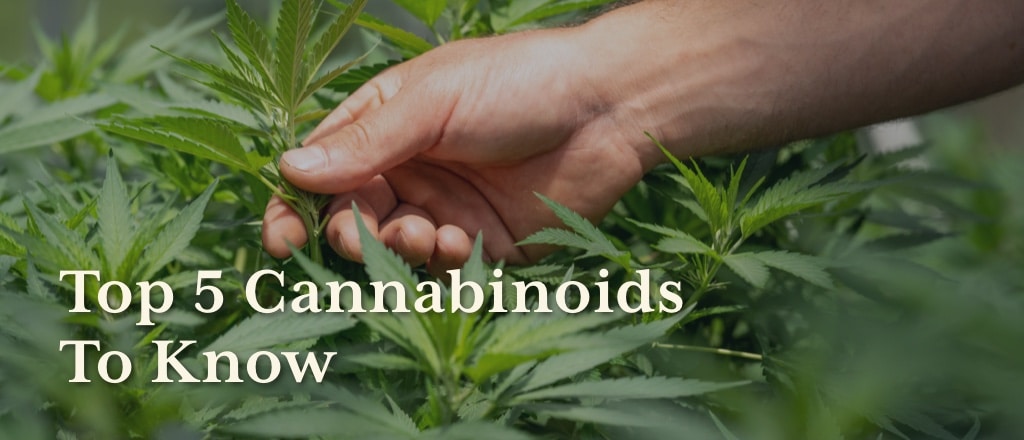

Did you know that there are approximately 480 chemical compounds in cannabis? Around 100 of those are cannabinoids, naturally occurring compounds that bind to receptors in our central nervous system when smoked or otherwise consumed. Our bodies naturally create endocannabinoids, which bind with the same receptors to stabilize the body and help us to maintain good health. We do not yet understand how all cannabinoids affect the human body, but as research continues, we find more and more medical benefits. The most abundant and well known cannabinoids are THC and CBD. Although both are crucial to cannabis, they are not the only extraordinary compounds to be found. Read on for a deep dive of the top five cannabinoids you should know!
THC – ∆9-Tetrahydrocannabinol
You know him, you love him, it’s our beloved THC, the most well known and widely researched of all cannabinoids. THC is also the most abundant cannabinoid in cannabis, and most importantly, the one that gets you high. First isolated in 1964, THC essentially coaxes your brain to release dopamine, making you feel relaxed and happy.
In 1988, scientists discovered there was a link between THC and the endocannabinoid system. Studies since then have shown all kinds of benefits, including helping to make it possible to control pain with smaller amounts of opioids. THC has 20 times the anti-inflammatory strength of aspirin! It has been used to treat cancer, chronic pain, MS, glaucoma, fibromyalgia, Huntington’s disease, ALS, Tourette’s syndrome, and pruritus. It also stimulates the appetite, which can be very helpful for those undergoing chemotherapy.
CBD – Cannibidiol
CBD is the second most abundant cannabinoid, the most prevalent in industrial hemp, and a multibillion dollar in industry in itself! CBD, when isolated from THC, is legal to possess in all 50 states and legal to sell in 47. In fact, 13 conservative states that are extremely anti-cannabis have legalized its use just to treat childhood epilepsy!
CBD has no psychoactive effects but is incredible at calming the nervous system. In addition to epilepsy, CBD can help treat seizure disorders, cancer, MS, chronic pain, anxiety, diabetes, arthritis, dystonia, Chron’s disease, and general inflammation. There is evidence that CBD interacts with brain cells, including opioid receptors, which regulate pain, and dopamine receptors, which control behavior. CBD may also balance out the potential anxious side effects associated with THC.
CBN – Cannabinol
If weed is exposed to too much air or heat, over time the oxidation of the THC creates CBN, a cannabinoid with mild psychoactive effects that makes for major couch lock when combined with THC. Because it can be a sign of old or stale flower, generally smokers are not excited to find it in their stash, but CBN has many benefits! CBN is mildly intoxicating and linked with reduction in pain, with studies showing that the combination of CBN and THC can significantly decrease pain levels. It is helpful for treating insomnia, nausea, and is also an anticonvulsant meaning it can assist with seizures.
CBG – Cannabigerol
CBG is a remarkable cannabinoid that is a building block for both THC and CBD, often referred to as the mother of all cannabinoids. It was first synthesized in 1964 with THC and has been studied extensively for its medical benefits. More common in hemp than cannabis, there is less than 1% in most weed strains, but it is an essential piece in creating many benefits that cannabis offers. CBG is anti-bacterial and anti-tumor and can help with nausea, anxiety, glaucoma, IBS, Huntington’s Disease, ADHD, and low appetite.
CBC – Cannabichromene
CBC is the second most common cannabinoid in many strains, and the third most common overall. It has no psychoactive effects but is antibacterial and antifungal, as well as known to arrest tumor growth, improve mood, inhibit acne, and regenerate bone and brain cells! CBC plays well with others and is a great team player among other compounds to create The Entourage Effect.
While all of these amazing cannabinoids work great individually, they work best in conjunction with each other. Ask your local Timber budtender for custom recommendations and more information!


